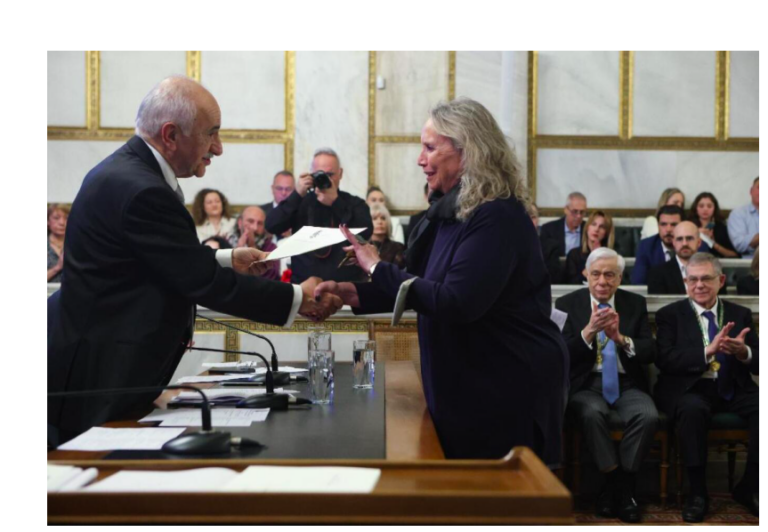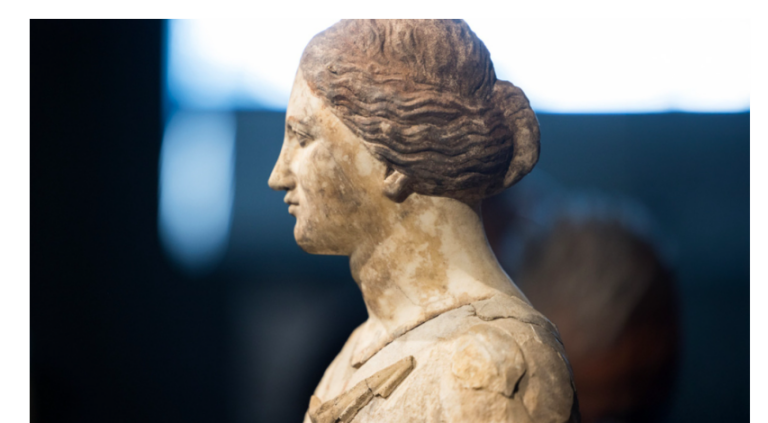Hello, Holy Tuesday today, the Hymn of Kassiani is chanted in churches and I had quite a scare when I saw headlines saying that…Christina Bomba was “lost in the jungle,” but then I calmed down because I realized that “lost” was somewhat poetic and Christina (in her gorgeous swimsuit) is on holiday with her family in some exotic place, from where she posted those photos in the middle of Holy Week.
Surprises?
Now, to the mundane… I gather that certain moves in geopolitics aren’t random, e.g., Netanyahu’s phone call to Mitsotakis last Friday, or the tightening of relations with the French. That’s why… I have a hunch that some interesting developments might be coming soon—we’ve got a KYSEA (Government Council for Foreign Affairs and Defense) meeting tomorrow morning after all, and the agenda isn’t just about tariffs and defense procurements (we’re also getting a fourth Belharra frigate).
Praise and dining
We’ll have high-profile guests in our area today, as Eurogroup President Paschal Donohoe is arriving. He’ll be meeting with both Mitsotakis and Pierrakakis and will have good things to say about the Greek economy—and why shouldn’t he, since our numbers are better than the Eurozone’s in many indicators? Not to mention, we’ve stopped being the black sheep. After visiting Maximos Mansion and the Ministry on Nikis Street, Donohoe will have lunch with Kyriakos Pierrakakis at a restaurant… located within the minister’s electoral district.
Dimas hits the gas
After a first, exploratory period, the new Minister of Infrastructure, Christos Dimas, has started getting things done to resolve pending issues. Today, he’ll be conducting an inspection in Thessaloniki, checking out the Flyover project and inspecting the metro extension toward Kalamaria, which will be ready by February 2026. I’m also hearing that after Easter, the contracts for the BOAK (Northern Road Axis of Crete) and the Daniel disaster restoration works will be signed, and on Thursday the long-awaited contract signing for the Asopos dam will also be announced.
Conference in the fall
Quite a bit is going on within the New Democracy party as well, following the “reshuffle” in Parliament yesterday where Mitsotakis basically “placed” MPs who didn’t become ministers into coordinator positions on committees. What can you do—not everyone gets lucky. Today marks the debut (on ERT) of the new spokesperson Alexandra Sdoukou, while Nikos Romanos has already started working in his new office on the second floor as the director of digital media. What’s particularly interesting, I hear, is that the party conference is now scheduled for the fall, and it will take place after internal elections are held to select the heads of prefectural and municipal organizations, as well as the conference delegates.
The shadow blue ministers and…
We usually see roles like sector chiefs or “shadow ministers” in the main opposition, which aims to have battle-ready personnel when it comes to power. In that sense, the Prime Minister’s decision to assign sectoral responsibilities to specific MPs came as a bit of a surprise. For example, Larissa MP Christos Kapetanos has been appointed representative on the Committee on Educational Affairs, essentially like a shadow education minister. Similarly, Dimitris Kairidis from the northern sector got Defense and Foreign Policy, Dimitris Markopoulos from Piraeus B got Development and Trade, Stavros Keletsis from Evros got Justice and Police, Stavros Papasotiriou from Florina got Health and the welfare state, while Stelios Petsas from Eastern Attica got the Economy.
…the always complaining ones
With the distribution of roles, Maximos Mansion says it aims to improve communication between Parliament and ministries and to better process draft legislation under discussion. On the other hand, the ill-intentioned claim that this is just a way to “sugarcoat the pill” for those who still view entry into the government as a distant dream. Of course, there are also the perpetually complaining ones, who rushed to voice objections—both left and right—because the roles were assigned to inexperienced parliamentarians who are in their first or, at most, second term. However, what I’m hearing is that more battle-tested members were initially approached but declined.
Womb trade – new law
One of my sources at Maximos apparently read yesterday’s post about the protest being prepared by MPs over the legislative change by Floridis, which would ban surrogate mothers from being used by same-sex couples. On that topic, they sent me a clarifying note, which I am sharing, as it comes from a serious source. “Womb trade in Greece has existed since 2014, when the Samaras government relaxed, through a specific provision, the conditions for women to carry pregnancies, allowing foreign women to come for payment from abroad to meet the needs of heterosexual couples. So a trade of surrogate wombs was created in Greece back then and it has nothing to do with same-sex couples. The law on marriage equality didn’t touch the legal framework for surrogacy, which remains prohibited for same-sex couples or single men. There is not a single court decision since the marriage equality law that recognizes the possibility or right of same-sex couples to access surrogacy. There is only one decision from 2009 by a court that clearly misinterpreted the law, but that did not create any legal precedent, as evidenced by the fact that 16 years later no similar ruling has been made. With the new Justice Ministry bill, the government is repealing the Samaras provision, and that is the real political message—reinstating the legal status that existed before 2014, when surrogacy in Greece was strictly limited to heterosexual couples or single women. This is the height of hypocrisy. Those now shouting against surrogate wombs are the same ones who created this ‘market,’ which clearly operates on the edge of legality. And now Mitsotakis is rightly restoring the previous status. Surrogacy should be an altruistic act, and in any case, it is just one subcategory of assisted reproduction, which includes many other techniques for couples facing infertility. It cannot become an object of trade or female trafficking.” So I’m passing this along to show I’m not only presenting one side of the story.
The SSM hasn’t (yet) given the green light for dividends
What we learned from yesterday’s General Assembly of Piraeus Bank is that the SSM has not yet given the green light for dividend distribution. That’s why the bank’s chairman, G. Hatzinikolaou, when asking shareholders to vote on the dividend corresponding to 35% of profits, noted that it remains subject to supervisory approval. I assume there’s no particular issue—at least regarding the 2024 fiscal year dividend—and that the SSM is simply taking more time to form a clearer picture of broader developments. After all, the experience from last year shows that the distribution rates proposed by banks at their general assemblies are more or less pre-agreed with the SSM, followed by a formal approval. This year, it appears that the formal approval has—so far—been delayed. Not surprising, given everything going on in the world. Still, last year’s approval for dividends was also issued in May.
Private schools, profits and investments
If you’re wondering why foreign investors have swept up well-known private schools, perhaps the answer lies in their financial results and real estate assets. Doukas Schools, in their financial report for the fiscal year ending June 2024, reported revenue of €15.16 million, up 9.1% compared to €13.89 million in 2023.
The schools had net profits of €893,000 versus losses of €498,000 in 2023. The estimate for the current year is that total revenue will reach €16.2 million, of which €13.9 million will come from tuition fees, with net profits reaching €1.4 million. The school enrolls 1,592 students, with the average annual tuition fee being €8,735. As for Ellinogermaniki Agogi, which recently changed hands and is now controlled by the British ISP group, a company named “AKITOUS SA Property Management” was established, to which the school’s real estate assets were transferred. The value of the transferred properties amounts to €3.98 million.
Eleftherios Venizelos Eyes Airports
Among the (very) interesting points from yesterday’s assembly of the Athens International Airport was the response to a shareholder’s question regarding the AIA’s possible interest in airport concession tenders across Greece. CEO Yiannis Paraschis stated that “indeed we can participate, and we will consider it enthusiastically in the future, with the attention to detail that characterizes us.” It is worth noting that in the coming months, tenders for regional airports will be launched, while there are also plans to utilize other airports. A question was also raised about the reasons behind the acquisition of a stake in the Athens International Airport by the Vassilakis Group of AEGEAN – Autohellas. Mr. Paraschis stated, “Why Aegean chose to invest should be a question directed to them. However, it is well known that the company has significantly invested in its operations within the Eleftherios Venizelos premises, is investing in the technical base inside the airport, and is constantly increasing its connectivity. Obviously, the airport’s activity is being positively evaluated.” In the financial statements of Autohellas, it is stated that at the end of 2024 the company acquired 120,000 shares of the AIA.
Fessas’ Chinese Gold
Back in 2016, when Theodoros Fessas struck a commercial deal to bring to Greece a relatively unknown but rapidly growing brand, could he have anticipated the trajectory it would follow in the years to come? The brand in question is Xiaomi, which has since proven to be a goldmine for Info Quest Technologies, a subsidiary of the Quest Group. Last year, sales of Xiaomi and POCO smartphones (POCO being a sub-brand of Xiaomi) grew by 24%, with over 800,000 units distributed in Greece, Cyprus, and Malta. In Greece, the Xiaomi brand is extremely popular, holding second place in smartphone market share and first place in electric scooters, robotic vacuums, headphones, etc. At the same time, sales from Xiaomi Stores in Greece and Cyprus recorded a 70% growth for the third consecutive year. What’s the next step? Xiaomi has made a strong entry into electric mobility, aiming to become one of the five largest automakers globally, and its first electric vehicle, the Xiaomi SU7, is already achieving significant sales in China. Mr. Fessas had previously mentioned that the Chinese giant’s venture is of interest to Quest, but it must be built on solid foundations and, in any case, is not expected before 2027.
Metlen’s Strong Rebound
From the edges of €39, Metlen “took off” to €42, posting gains of nearly 8%—its best daily performance in the past 18 months. In doing so, it erased the losses from the global sell-off in early April, coming within a breath of its recent all-time high of €43.26. This is a peak that appears likely to be surpassed, as a few days ago Citi reiterated its target price of €46, Eurobank Equities raised it to €51, and Pantelakis Securities to €52. An additional positive catalyst is the defense agreements with Italy’s Iveco and France’s KNDS, with other collaborations also in the pipeline. All this comes ahead of the Q1 financial results announcement on April 24 and the crucial Capital Markets Day on April 28, where the group’s CEO, Evangelos Mytilineos, is expected to reveal two pleasant surprises he hinted at in a Bloomberg interview.
Technology Leads Europe, Banks Drive Athens
Nowadays, a daily trading value of around €150 million is considered low on the Athens Stock Exchange and indicative of cautious positioning. With the major European markets posting gains, the General Index in Athens comfortably reached 1,625.77 points with a +2.73% increase and trading volume at €152.4 million, of which €16.2 million were in block trades. Banks, Metlen, and TITAN (following its recent acquisition) took center stage on the board, with Alpha (+6.66%) standing out, Eurobank at €2.33 (+5.38%), National Bank at €8.714 (+2.52%), and Piraeus (+2.61%) at €4.64. Bank of Cyprus (+3.4%) at €5.48 led the rumors regarding index restructuring in MSCI and FTSE after Easter. In Europe, a shift in tariff policy on high-tech products led to gains across all tech stocks, but in Greece, banks were steering the market’s upward course. All of the Stassinopoulos Group’s stocks showed positive signs, with Cenergy (+3.45%) at €8.26, ELVALHALCOR (+2.9%), and parent company Viohalco (+2.6%). Yesterday was a good day for the stock market, with 106 stocks showing gains and only 16 showing losses.
Douzoglou’s Capital Increase
You’ve already read on newmoney the recent “news” about Theodoros Douzoglou, the Greek-Venezuelan real estate investor, lately revolving around the (unclear) fate of the historic hotel “Pentelikon.” A hotel that has been “reopening” for years now, either under the “umbrella” of Hilton or other major operators—some of whom have turned out to have no idea what’s going on. Apart from that, I learned that his company, “Fjord Real Estate Development,” based near Syntagma, recently held an Extraordinary General Meeting of shareholders. I imagine gathering the participants wasn’t too difficult, as Mr. Douzoglou himself is both shareholder and manager. This took place on March 27, during which a decision (unanimous, I’d assume…) was made to increase the company’s share capital by €177,400 through the issuance of 35,480 new common registered shares, each with a nominal value of €5 and issued at par. All of them were acquired by the Cypriot company Carlali 7 Limited. It’s worth noting that this company is the sole shareholder of “Fjord Real Estate Development.” The process moved… lightning-fast, as confirmed by a manager’s act (i.e., Douzoglou’s) dated March 28, 2025, certifying the full payment of the capital increase of €177,400, as decided by the shareholders’ General Assembly on 27/03/2025.
Denmark Grabs Its Weapon
Danish Prime Minister Mette Frederiksen asked her fellow citizens to give up one day of their annual leave to fund the country’s defense program. At the same time, Denmark’s pension funds (like those in Canada) are pulling out of or freezing their investment plans in the U.S., citing concerns over Donald Trump’s unpredictable policy decisions. The U.S. stock market relies on investment confidence from abroad—on the money of big global investors, naturally, and on pension funds. Since early 2025, foreign investors have held a record 18% of U.S. stocks. Sixty years ago, in the 1960s, foreign investors held just 2% of U.S. stocks. By 2000, this figure had risen to 7%. Today it has reached 18%. Of this foreign investment on Wall Street, about 49% comes from European investors and 25% from the Americas.
Ask me anything
Explore related questions





